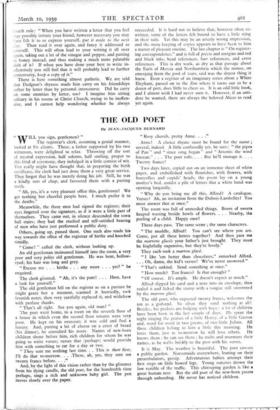THE OLD POET
By JEAN-JACQUES BERNARD
The registrar's clerk, assuming a genial manner, looked at his clients. These, a father supported by his two witnesses, were delighted to relax. Throwing off the sort of neutral expression, half solemn, half smiling, proper to this kind of ceremony, they indulged in a little contest of wit. You really might have thought that, in preparing the birth certificate, the clerk had just done them a very great service. They forgot that he was merely doing his job. Still, he was a kindly sort of chap, and favoured them with a parting truth.
" Ah, yes, it's a very pleasant office this, gentlemen! We get nothing but cheerful people here. I much prefer it to the deaths."
Meanwhile, the three men had signed the register; their eyes lingered over the signature, as if it were a little part of themselves. They came out, in silence descended the town hall stairs; they had the studied and self-satisfied bearing of men who have just performed a public duty.
Others, going up, passed them. One such also made his way towards the office of the registrar of births and knocked timidly.
" Come! " called the clerk, without looking up.
An old gentleman insinuated himself into the room, a very poor and very polite old gentleman. He was bent, hollow- eyed; his hair was long and grey.
"Excuse me . . . births . . . any more . . . yet?" he enquired.
The clerk gru. nted. "Ai, it's the poet! . . . Here, have a look for yourself."
The old gentleman fell on the register as on a pasture he might graze but a moment, scanned it hurriedly, took feverish notes, then very carefully replaced it, and withdrew with profuse thanks.
"That's all right. See you again, old man! "
The poet went home, to a room on the seventh floor of a house in which even the second floor tenants were very poor. He kept on his overcoat; it was cold and fuel a luxury. And, putting a bit of cheese on a crust of bread (his dinner), he consulted his notes. Names of new-born children shone before him, rich children for whom he was going to write verses; verses that (perhaps) would provide him with something to eat for a day or two.
"They sent me nothing last time. . . This is their first; r11 do that to-morrow. . . .These, ah, yes, they sent me twenty francs before. . . ." And, by the light of this vision rather than by the glimmer from his dying candle, the old poet, for the hundredth time perhaps, sings a rich and unknown baby girl. The pen moves slowly over the paper. "Rosy cherub, pretty Anne. . . ."
Anne! A choice rhyme must be found for the name ; several, indeed. A little confusedly yet, he sees: "the pipes of Pan" and "since song began" and "Artemis the wind foreran." . . . The poet toils. . . . But he'll manage it. . . . Twenty francs!
Two days later, copied out on an immense sheet of white paper, and embellished with flourishes, with flowers, with butterflies and cupids' heads, the poem lay on a young mother's bed, amidst a pile of letters that a white hand was opening languidly.
"Why do you bring me all this, Alfred? A catalogue. Verses! Ah, an invitation from the Dubois-Lambelles 1 You must answer that at once."
The room was full of unneeded things. Boxes of sweets heaped wasting beside bowls of flowers. . . . Nearby, the purling of a child. Happy ease!
Three days pass. The same scene ; the same characters.
"The muddle, Alfred! You can't see where you are. Come, put all these letters together! And then pass me the marrons glaces your father's just brought. They must be frightfully expensive, but they're lovely."
They each took a marron glace.
"I like 'ern better than chocolates," remarked Alfred. . Oh, damn, the kid's verses! We've never answered." "That's unkind. Send something at once."
"How much? Ten francs? Is that enough?"
"Of course. It's ample. He doesn't expect as much."
Alfred slipped his card and a note into an envelope, then sealed it and licked the stamp with a tongue still sweetened by the marron glace.
The old poet, who expected twenty francs, welcomes the ten as a godsend. So often they send nothing at all! Besides, his pockets are bulging with hope: a lot of children have been born in the last couple of days. He spent the night singing the praises of a little Henry, of a little Gaston and, word for word in two poems, of two little Juliets. All these children belong to him a little this morning. He loves them, just as to-morrow he will love others. He knows them ; he can see them ; he melts and murmurs their names, as he walks briskly to the post with his verses.
It is May. The weather is beautiful. The poet crosses a public garden. Nursemaids everywhere, leaning on their perambulators, gossip. Adventurous babies attempt their first steps on little bowed legs. Young outcries drown the low rumble of the traffic. This chirruping garden is like a great human nest. But the old poet of the new-born passes through unheeding. He never has noticed children.










































 Previous page
Previous page